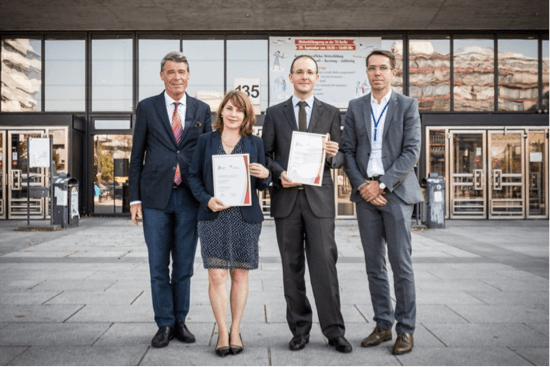Wilhelm-Feuerlein Research Award 2016
On September 7th, 2016, the Oberberg Stiftung Matthias Gottschaldt and the Deutsche Suchtstiftung bestowed the Wilhelm-Feuerlein Research Award to the awardee, PD Dr. Eva Hoch within the scope of the 7th German Addiction Congress in Berlin.

PD Dr. Eva Hoch (head of the work group cannabinoids), Department of Psychiatry & Psychotherapy at the University Hospital Munich, was appreciated for her scientific work in the field of application and clinical research „Treatment of cannabis-related disorders“. The scientist is the head of a translational research programme, in which the modular treatment programme „CANDIS“ for older adolescents and for adults with cannabis abuse and dependence was developed, evaluated and transferred into treatment.
http://www.oberberg-stiftung.de/abstract-dr-rer-nat-eva-hoch.html
Research Award of the German Society for Behavioural Therapy
On March 12th, 2010, the CANDIS Project Group received the Junior Award of the German Society for Behavioural Therapy (DGVT) for outstanding research performances in the field of further development of the behavioural therapy.
Laudatory speech on the occasion of the DGVT Advancement Award 2010 to the CANDIS work group:
Ladies and Gentlemen, dear colleagues, dear CANDIS work group,
a laudation is always something special. We herewith honour the outstanding performance which stands out beyond the everydayness and is pathbreaking for the future. For me it is a very special pleasure today to hold the laudation speech for the bestowal of the DGVT Advancement Award 2010 for outstanding junior research performances in the field of development of the behavioural therapy, to the CANDIS work group. First let me introduce the awardees of the work group personally in alphabetical order. The following qualified psychiatrists under the head of Dr. Eva Hoch, have participated in one of the two project phases during the years 2004 – 2010: Katrin Dittmer, Jana Henker, René Noack, Anja Pixa, Heike Rohrbacher and Anne Rühlmann. Due to time restriction I will only present the academic career of Dr. Hoch in place of the working group:
Dr. Hoch has studied psychology from 1991 – 1997 in Marburg. Following she initially worked at the Chair for Psychology at the Technical University of Munich (subject: health promotion and protection of labour), then from 2001 at the Institute for Therapy Research (IFT) in Munich (subject: Analysis of the problematic situation and trends of illegal drugs for the European Observatory for Drugs and Drug Addiction).
From 2002 – 2005 she worked at the Max-Planck Institute for Psychiatry on studies for smoking cessation in the family practices, and in 2005 she obtained her doctorate with honours at the TU Dresden (Prof. Wittchen). For her promotion she received the Research Award 2006 of the German Society for Addiction Research & Addiction Therapy. Since 2005 she is head of the project of the CANDIS work group at the TU Dresden. Dr. Hoch has published around 15 journal articles since 2005, several book chapters and has given around 35 lectures. What is special about the performance of this group? They have developed a therapy programme, have evaluated it on a patient’s sample and have evaluated its efficacy in a randomised-clinical control group study. This kind of work is certainly done many times per year in Germany and does not necessarily lead to an award.
Yet, the CANDIS work group has really achieved something special and I would like to explain this in three central features of their work:
1. High therapeutic need for action
The work group has developed an outpatient therapy programme for cannabis use disorders. If we go back to the time from 2002 – 2004 when the study was planned and started, there was an increasing treatment need. The number of persons with cannabis abuse or dependence in the adult population continuously increased from 430.000 in 1997 to 620.000 in 2006, i. e. about nearly 50%. The number of persons in outpatient treatment settings has continuously increased from 7.000 in 1999 to around 26.500 in 2008, i. e. around 400% higher. For this enormous increase of treatment need, no evaluated therapy programme existed at that time, neither in Germany nor in Europe and only few worldwide. Cannabis was regarded as non-severe drug, the question of developing dependence was discussed controversially and treatment need was negated for a long time. In the US, a programme for younger adolescents existed with a strong family-orientated component, but no programme for older adolescents and younger adults with independent lifestyle was available. Therefore, this programme has closed an important gap!
2. Innovative research approach
The therapy study was planned and carried out groundbreaking in many respects. We will not have the time to go into details, but I would like to state the following issues shorthand:
Contrary to normal treatment times of months or years in the addiction counselling centres, this programme was planned very briefly for German conditions with 10 contacts in about two to three months. Implementation was done ambulatory. An important access into individualisation of treatment was started by failure-specific assignment of therapy components. Even if this kind of individualisation was not as successful as expected, important information for alternative strategies for individual assignment of interventions and failure-profiles were assessed which could be applied for the basic research of behavioural therapy. The programme was manualised and thus is available for a broad application in health care. The study had a scientifically valuable randomised control group design incl. a systematic survey of the manual adherence.
3. Proven practicability
Scientists are often criticised to achieve results under idealised conditions of the ivory tower “university” with adequate equipment, highly motivated collaborators and unrealistically high treatment intensity, which can never be transferred into practice. This project has shown that it is possible, to realise the therapy concept also under daily conditions of outpatient addiction facilities and even more interesting, with equally good results! After three years of testing (2004 – 2007) the workgroup has retested the therapy programme at the TU Dresden with a second therapy phase in 11 outpatient addiction facilities on 400 patients under normal conditions in a second randomised clinical control study. The collaborators of the setting were trained and supervised, but the recruitment, diagnostics, therapy and documentation was exclusively the responsibility of the outpatient counselling and treatment facilities. Altogether, resonance of collaborators was outstanding.
High therapeutic need for action, innovative research approach and proven practicability: three outstanding features of the workgroup headed by Dr. Hoch, are really worth an award!
Prof. Dr. Gerhard Bühringer
